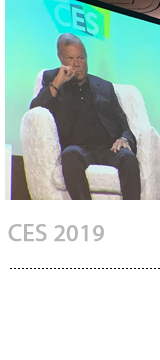
While industry executives were ogling Alexa-enabled gadgets and 8K roll-up TVs at CES on Tuesday, Martin Sorrell took the stage to talk about the future of the industry and his new holding company, S4.
The former WPP CEO, joined on stage by S4’s newly minted board members, MightyHive CEO Pete Kim and MediaMonks CEO Wesley ter Haar, discussed the future of agencies, the status of the duopoly and what’s real and what’s hype at CES this year.
The trio also delved into S4’s strategy, which plans to connect MediaMonks’ production capabilities with MightyHive’s programmatic chops to execute personalized media at scale.
But unlike Sorrell’s playbook at WPP, that plan may not involve buying or investing in ad tech.
“We want to be agnostic,” Sorrell said. “We don’t want to be a position where we are vulnerable due to the volatility and consolidation that is happening in the ad tech industry.”
Here are a few highlights from Sorrell during the chat on industry trends.
On client-agency relationships
“When you ask [big clients] what their biggest issue is, they say lack of speed. Clients say that about agencies as well. They’re too slow. Even the smaller, independent agencies don’t move as quickly as clients want. The premium is on speed.
[But] clients are going to have to change their structures too. It’s all very well to put pressure on [agencies] to change, but they are going to have to change as well. They suffer from the length of their internal procedures. Those companies don’t move at light speed.”
On in-housing
“Clients have become concerned about the amount of influence they’ve offloaded to agencies. The client feels so dependent on the agency. Given the importance of data to the consumer relationship, they believe they need to build that [back] up. It’s about control.
The agency objective is to stay as an incumbent. There’s a real desire to experiment with the model where service providers are flexible. How many times did I hear clients in my last year at WPP say, ‘We don’t need the big set pieces by big agencies’? They might need them around the Super Bowl or Christmas, but what they need is always-on content at speed and at a low cost.
[But with in-housing] there are issues around keeping good talent and keeping up with technology.”
On the duopoly
“We’ve been looking for the third force. We thought it might be Oath. We thought it might be AppNexus. We thought it might be Twitter or Snap. My own view is that Amazon will become as big as Google and Facebook in fairly short order.
What people don’t understand is the heart of Facebook’s and Google’s business are not the big brands. It’s [about] 60% to 70% in the long tail. I’m not a believer that Facebook is in as difficult of a position as some might suggest. What you lose on the Facebook swing, you win on the Instagram round out.
What our clients cannot deal with is the data issue. The control of data is the battleground.”
On CES
“I think the lesson is connectivity and data. It’s not rolled up TVs or 8K. It’s not about autonomous driving. It’s really about the data. It comes back to control and influence [over] what these devices are giving you, the opportunities to understand consumer preferences. First-party-data or data other sources fuel the development of in content in a way we haven’t seen.
Voice will have the biggest impact over the next five years. I remember the real estate battle between Google and Amazon in Christmas of 2017. They were discounting Alexa and Google Home to get them into the house as soon as possible. It’s a real estate battle to get control and influence. Then functionality will change.”
This post was syndicated from Ad Exchanger.


More Stories
By the Book: How ‘The Fugitive’ Director and an Investigative Journalist Collaborated on 2024’s Timeliest Thriller
The Best Holiday Ads of 2024
The Year in Ratings: How the Major News Outlets Performed in 2024